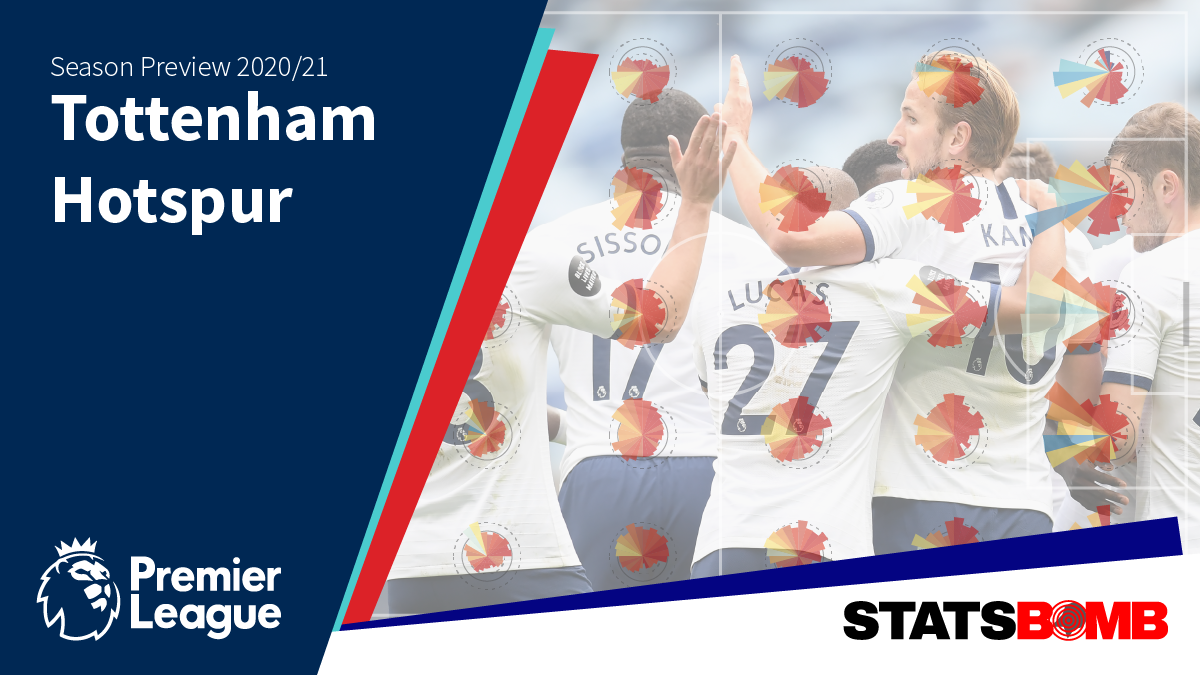Ahead of 2019-20, on the surface, it was relatively easy to be positive about the future for Tottenham. Fresh from another top four finish and a memorable run to the Champions League final, the club had finally secured the future of its midfield by acquiring Giovani Lo Celso on a loan-to-buy deal from Real Betis while Tanguy Ndombélé had arrived for a large fee from Lyon. Sure, the club had no rotation for Harry Kane and their metrics had been declining alarmingly for 18 months, but what could go wrong? A TV show was even commissioned! 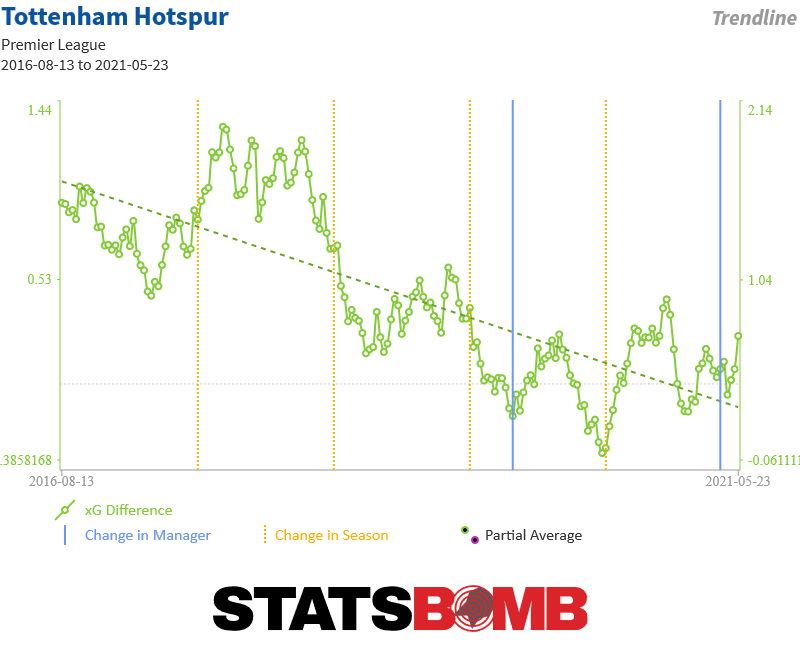 Well, the first thing that went wrong was that the metrics got worse. The second thing that went wrong was the results were terrible. The third thing that went wrong was Mauricio Pochettino was fired. Really, this was all just one large thing that engulfed the club in a manner befitting of a 22-minute segment in a documentary. There was no way around it though, Tottenham had three wins from twelve in the league, had deserved no more from their performances and had been annihilated 7-2 in the Champions League by a promising German side, Bayern Munich. Enter Mourinho. On the surface the 26 league games Mourinho has overseen have been just about good enough. Tottenham got 45 points (65 point pace) which ranked fourth and their goal difference of +13 ranked fourth too. What that conceals is that Mourinho’s tenure has already been through three distinct acts, and the main hope for fans is that the most recent of those acts involved winning more frequently than not. It's also challenging to get used to a Tottenham team that plays very different football to that of the best of Pochettino--and by the time of his departure, despite the Champions League run, that best was a long time passed. Act 1: Duration: 8 games in 2019 Results: 5-1-2 GD: +6 xG: +5 Note: xG Against at 0.65 per game is best in the league The start for Mourinho was promising but didn't come without disappointments. Defeats against his two former clubs, Manchester United (2-1 at Old Trafford in a low event game decided by a Marcus Rashford penalty) and Chelsea (2-0 at home, a Willian penalty sealing the deal soon after renowned hatchet man Son Heung-min was sent off) were classics in the "create nothing, try not to lose" Mourinho canon. Elsewhere the team won five from six before the turn of the new year and certain metrics shone brightly; in defence, the team was giving up very few shots, specifically in good, central dangerous locations. Occasional penalties apart, Tottenham were repelling all. Yes, the schedule was quite kind, but there was a win over Wolves in there too alongside more straightforward victories against lower ranked teams such as Burnley, West Ham, Brighton and Bournemouth. Something to build on? Act 2: Duration: 9 games in a world gradually learning about coronaviruses Results: 3-2-4 GD: +0 xG: -5 Note: xG Against at 1.82 per game is second worst in the whole league The second act was not-so-good. In fact it was downright bad. The schedule bit a little with defeats against Southampton (1-0, created nothing), Liverpool (1-0, played surprisingly well, at least in the second half), Chelsea (again 2-1, this time created nothing, deserved nothing) and Wolves (3-2, overpowered late on, gave it away). There was also a 2-0 win against Manchester City which was as equally improbable as the 2-2 draw earlier in the season at the Etihad. In both games City did enough to win multiple games but somehow couldn't get anything to stick. But the underlying concern came in the same form that had looked so promising weeks before. The defence faltered horribly, moving from league best to nearly league worst and in every one of these nine games Tottenham allowed xG worth between 1.4 to 3.7 per game. They didn't have a single defensively secure game all through and were averaging 16 shots per game against. Really grim stuff. Tottenham also departed the Champions League after being significantly worse than RB Leipzig and lost in the FA Cup on penalties to Norwich, the kind of result that is hard to explain away when you know, deep down, the manager would like to nab a trophy and quick. When the curtains came down on football, they had lost five out of six, and were limping along having been left weakened by injuries to key men such as Kane and Son. Act 3: Duration: 9 games, summer is here and so is your Premier League finale Results: 5-3-1 GD: +7 xG: -2 Note: xG For is 15th, xG Against is 6th Turns out a three month break does wonders for the health of a squad! With Kane and Son back fit, the back end of 2019-20 held a degree of promise. Results were generally good. Performances were... less so. The 0-0 with Bournemouth was about as poorly as Tottenham have played in memory, with the Sheffield United defeat not far behind. Tottenham's attack created very little during this spell: in six of nine games the took ten or fewer shots or failed to create more than one expected goal. To brazenly defy expected goals they also took the lead three times via an own goal. The only game in which the result happily matched expectation was the 2-1 derby win over Arsenal. The defence was sturdier--in four of nine games the expected goals allowed was less than one--and in two further games it was just a shade over. Overall, it's impossible to be analytically inclined and generally happy with how performances have developed across the Mourinho reign, but the better post-break results certainly eased pressure that had been building, even this quickly into his tenure. Style Undoubtedly the style of play is very different. After five hard years, the Pochettino press had already somewhat waned a deal of time before his departure:
Well, the first thing that went wrong was that the metrics got worse. The second thing that went wrong was the results were terrible. The third thing that went wrong was Mauricio Pochettino was fired. Really, this was all just one large thing that engulfed the club in a manner befitting of a 22-minute segment in a documentary. There was no way around it though, Tottenham had three wins from twelve in the league, had deserved no more from their performances and had been annihilated 7-2 in the Champions League by a promising German side, Bayern Munich. Enter Mourinho. On the surface the 26 league games Mourinho has overseen have been just about good enough. Tottenham got 45 points (65 point pace) which ranked fourth and their goal difference of +13 ranked fourth too. What that conceals is that Mourinho’s tenure has already been through three distinct acts, and the main hope for fans is that the most recent of those acts involved winning more frequently than not. It's also challenging to get used to a Tottenham team that plays very different football to that of the best of Pochettino--and by the time of his departure, despite the Champions League run, that best was a long time passed. Act 1: Duration: 8 games in 2019 Results: 5-1-2 GD: +6 xG: +5 Note: xG Against at 0.65 per game is best in the league The start for Mourinho was promising but didn't come without disappointments. Defeats against his two former clubs, Manchester United (2-1 at Old Trafford in a low event game decided by a Marcus Rashford penalty) and Chelsea (2-0 at home, a Willian penalty sealing the deal soon after renowned hatchet man Son Heung-min was sent off) were classics in the "create nothing, try not to lose" Mourinho canon. Elsewhere the team won five from six before the turn of the new year and certain metrics shone brightly; in defence, the team was giving up very few shots, specifically in good, central dangerous locations. Occasional penalties apart, Tottenham were repelling all. Yes, the schedule was quite kind, but there was a win over Wolves in there too alongside more straightforward victories against lower ranked teams such as Burnley, West Ham, Brighton and Bournemouth. Something to build on? Act 2: Duration: 9 games in a world gradually learning about coronaviruses Results: 3-2-4 GD: +0 xG: -5 Note: xG Against at 1.82 per game is second worst in the whole league The second act was not-so-good. In fact it was downright bad. The schedule bit a little with defeats against Southampton (1-0, created nothing), Liverpool (1-0, played surprisingly well, at least in the second half), Chelsea (again 2-1, this time created nothing, deserved nothing) and Wolves (3-2, overpowered late on, gave it away). There was also a 2-0 win against Manchester City which was as equally improbable as the 2-2 draw earlier in the season at the Etihad. In both games City did enough to win multiple games but somehow couldn't get anything to stick. But the underlying concern came in the same form that had looked so promising weeks before. The defence faltered horribly, moving from league best to nearly league worst and in every one of these nine games Tottenham allowed xG worth between 1.4 to 3.7 per game. They didn't have a single defensively secure game all through and were averaging 16 shots per game against. Really grim stuff. Tottenham also departed the Champions League after being significantly worse than RB Leipzig and lost in the FA Cup on penalties to Norwich, the kind of result that is hard to explain away when you know, deep down, the manager would like to nab a trophy and quick. When the curtains came down on football, they had lost five out of six, and were limping along having been left weakened by injuries to key men such as Kane and Son. Act 3: Duration: 9 games, summer is here and so is your Premier League finale Results: 5-3-1 GD: +7 xG: -2 Note: xG For is 15th, xG Against is 6th Turns out a three month break does wonders for the health of a squad! With Kane and Son back fit, the back end of 2019-20 held a degree of promise. Results were generally good. Performances were... less so. The 0-0 with Bournemouth was about as poorly as Tottenham have played in memory, with the Sheffield United defeat not far behind. Tottenham's attack created very little during this spell: in six of nine games the took ten or fewer shots or failed to create more than one expected goal. To brazenly defy expected goals they also took the lead three times via an own goal. The only game in which the result happily matched expectation was the 2-1 derby win over Arsenal. The defence was sturdier--in four of nine games the expected goals allowed was less than one--and in two further games it was just a shade over. Overall, it's impossible to be analytically inclined and generally happy with how performances have developed across the Mourinho reign, but the better post-break results certainly eased pressure that had been building, even this quickly into his tenure. Style Undoubtedly the style of play is very different. After five hard years, the Pochettino press had already somewhat waned a deal of time before his departure: 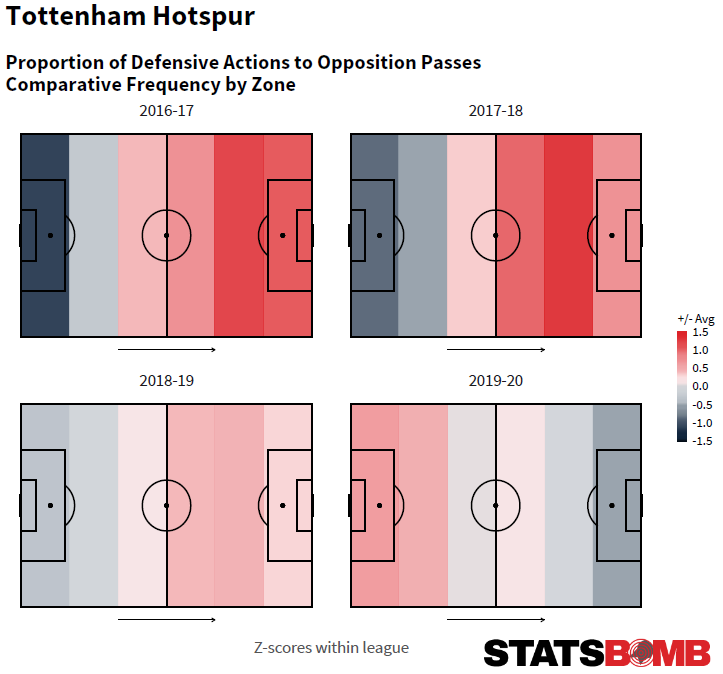 Despite clear mentions of pressing in the Amazon documentary, it doesn't really come out in the metrics. Tottenham may still work hard, but not as high up the pitch as before. The signing of Steven Bergwijn defines what Mourinho wants from his non-Kane attackers. Quick and able to stretch defences especially on the break, Bergwijn's talents categorise neatly alongside Lucas Moura and Son. Midfield has been a problem for Tottenham for a number of seasons, and Mourinho's solution was somewhat creative: try to bypass it.
Despite clear mentions of pressing in the Amazon documentary, it doesn't really come out in the metrics. Tottenham may still work hard, but not as high up the pitch as before. The signing of Steven Bergwijn defines what Mourinho wants from his non-Kane attackers. Quick and able to stretch defences especially on the break, Bergwijn's talents categorise neatly alongside Lucas Moura and Son. Midfield has been a problem for Tottenham for a number of seasons, and Mourinho's solution was somewhat creative: try to bypass it. 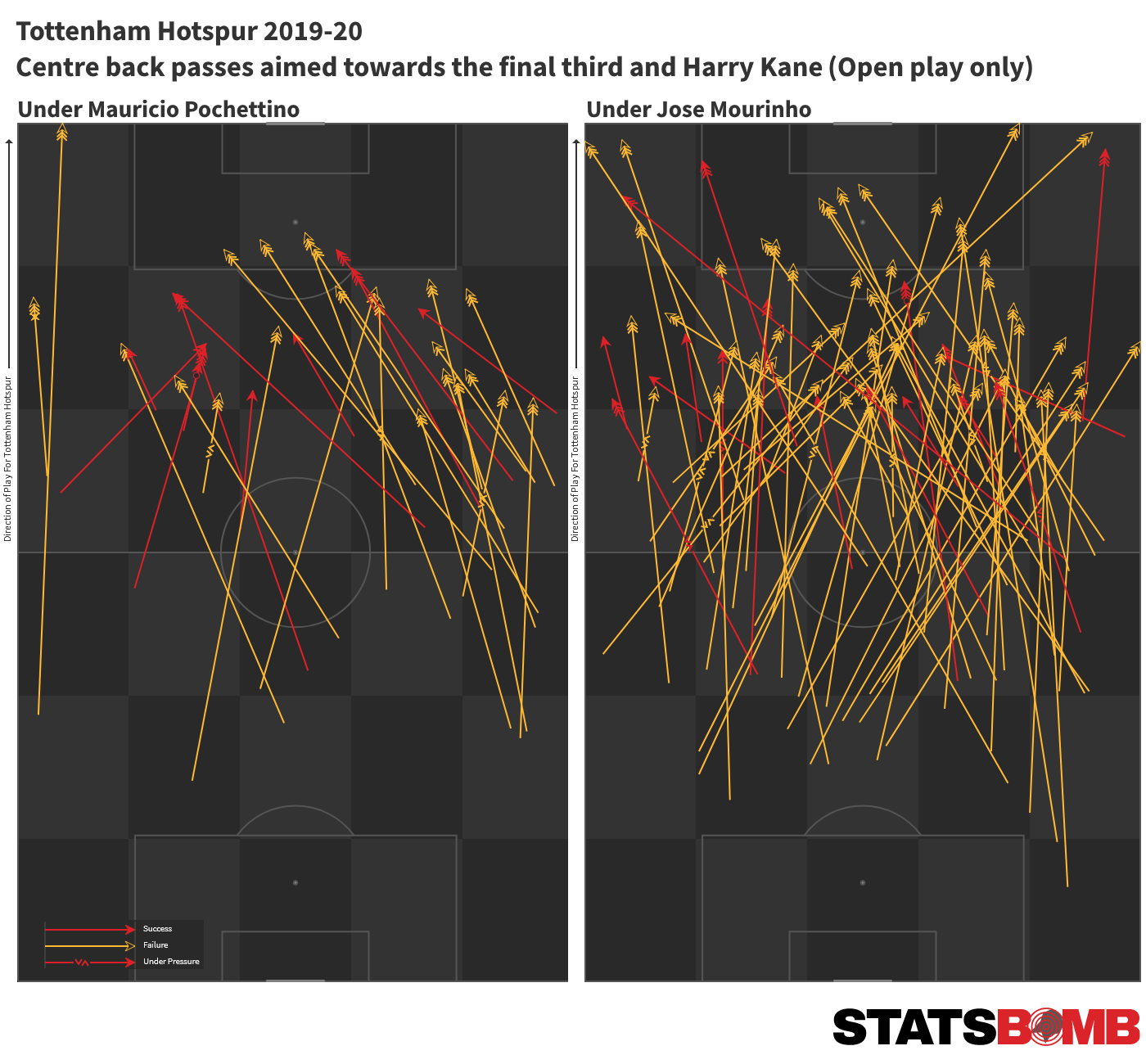 The change here from the steadier possession game deployed by Pochettino to a more direct targeted passing system was notable. The graphic shows balls aimed at Kane from centre backs in open play, and this type of pass went from three per game under Pochettino with a huge skew towards Alderweireld (over two-thirds of these passes were from him) to over five per game under Mourinho, with all the centre backs looking for this ball. The other attackers saw a similar uptick in receiving targeted long passes too, with Son, Lucas and eventually Bergwijn under Mourinho combining to receive nearly six of these passes per game up from three, and again a large skew away from just Alderweireld towards all centre backs. Both goalkeepers looked for similar out balls too, with a large rise in any keeper clearance (dead ball or otherwise) aimed at the forwards. This is also where the signing of Matt Doherty is interesting, as he's shown himself to be well capable in competing for long, high balls and taking up an advanced position -- Serge Aurier already takes up similar roles but hasn't the aerial prowess to dominate opposing full backs. Doherty may well be able to do this and provide flicks and nod downs, to help release Tottenham's speedy forwards. It's not total football, but it could well be part of the Mourinho plan. Personnel The eternal dance at Tottenham between Chairman Daniel Levy and incumbent managers regarding player acquisition appears so far to not be taking place with Mourinho. Players that have been recruited are not wildly expensive or apparently indulgent and may well be better than the raw detail suggests. The talent within the Tottenham squad is impossible to deny, from World Cup winner Hugo Lloris in goal right through to Kane up front. But supporting roles have waned over time, and the signings of Pierre-Emile Højbjerg and Doherty in particular, appear to show the intent to solidify key positions to perhaps allow the gifted attackers to flourish. There are distinct "do everything, but just a bit" vibes to Højbjerg's metrics in particular, but perhaps that's what this team needs: consistency and stability.
The change here from the steadier possession game deployed by Pochettino to a more direct targeted passing system was notable. The graphic shows balls aimed at Kane from centre backs in open play, and this type of pass went from three per game under Pochettino with a huge skew towards Alderweireld (over two-thirds of these passes were from him) to over five per game under Mourinho, with all the centre backs looking for this ball. The other attackers saw a similar uptick in receiving targeted long passes too, with Son, Lucas and eventually Bergwijn under Mourinho combining to receive nearly six of these passes per game up from three, and again a large skew away from just Alderweireld towards all centre backs. Both goalkeepers looked for similar out balls too, with a large rise in any keeper clearance (dead ball or otherwise) aimed at the forwards. This is also where the signing of Matt Doherty is interesting, as he's shown himself to be well capable in competing for long, high balls and taking up an advanced position -- Serge Aurier already takes up similar roles but hasn't the aerial prowess to dominate opposing full backs. Doherty may well be able to do this and provide flicks and nod downs, to help release Tottenham's speedy forwards. It's not total football, but it could well be part of the Mourinho plan. Personnel The eternal dance at Tottenham between Chairman Daniel Levy and incumbent managers regarding player acquisition appears so far to not be taking place with Mourinho. Players that have been recruited are not wildly expensive or apparently indulgent and may well be better than the raw detail suggests. The talent within the Tottenham squad is impossible to deny, from World Cup winner Hugo Lloris in goal right through to Kane up front. But supporting roles have waned over time, and the signings of Pierre-Emile Højbjerg and Doherty in particular, appear to show the intent to solidify key positions to perhaps allow the gifted attackers to flourish. There are distinct "do everything, but just a bit" vibes to Højbjerg's metrics in particular, but perhaps that's what this team needs: consistency and stability. 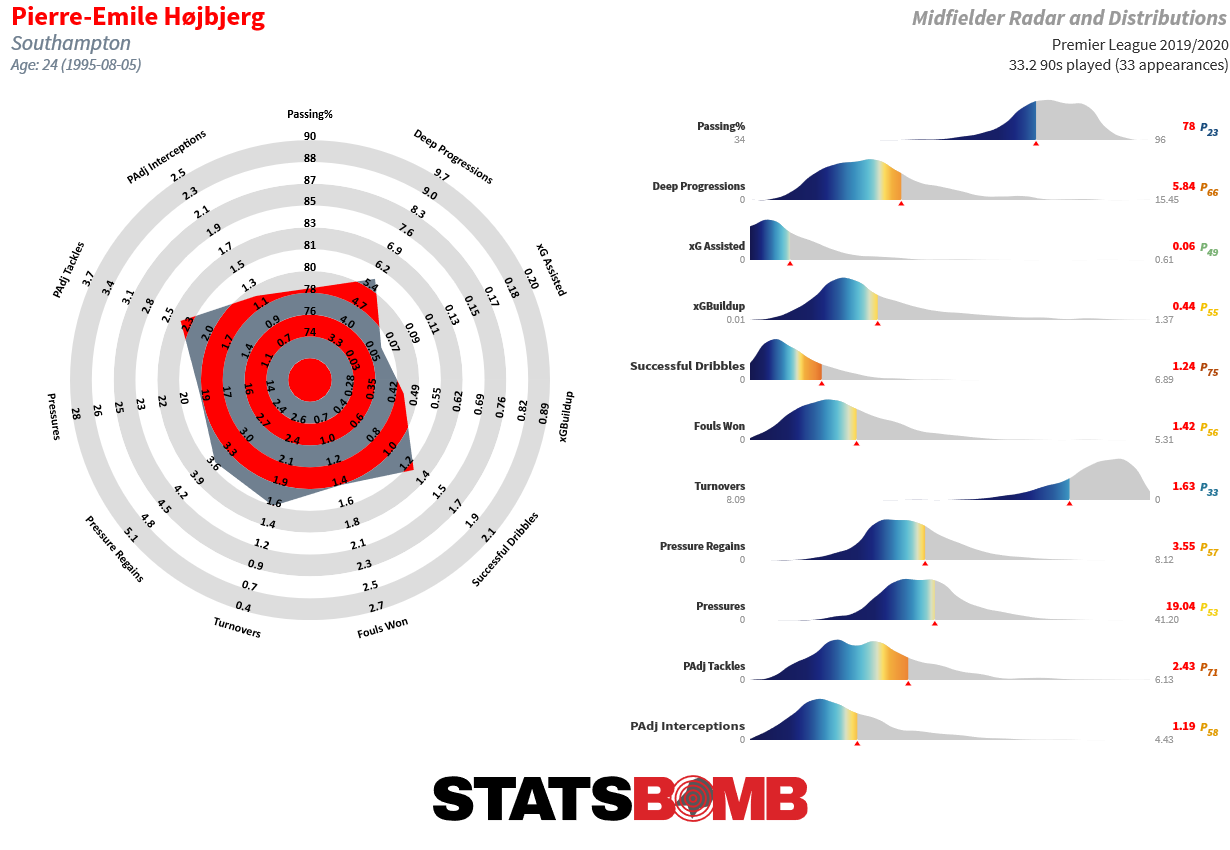 Will it work? Getting Højbjerg in as a likely guaranteed starter means we're unlikely to see Harry Winks and Moussa Sissoko start many games together with Giovani Lo Celso already the passing heartbeat of the side picked ahead of them. Doherty's arrival allows Aurier to depart and locks down one position. The attacking midfield band is rich with Dele Alli, Bergwijn, Moura, Son and Erik Lamela competing for a maximum of three positions. What of Tanguy Ndombélé? I'll plead the fifth, thanks. It's possible that the Frenchman's inability to nail down a starting place is indicative of the slightly altered transfer focus, as his signing combined with an investment in Jack Clarke and Ryan Sessegnon that is a long way off bearing fruit means £100m of summer 2019 purchases are not yet directly impacting the first team. Doherty and Højbjerg scope out at around £30m (and books are balancing a little more once Kyle Walker-Peters' departure is factored in) and will likely play every week. Getting purchases into the team and contributing counts for a lot. There are noises that more players could arrive, most notably a rotational striker, but in Covid-19 world, it's likely to be more book-balancing than big purchases, so it also depends who is on the outs. With football finishing only a month ago, we have fresh answers to long term questions. Whether Kane could refind something near to his best form after a six month break to recover from his latest injury appeared to be answered in the affirmative by a tidy finishing streak. To the casual eye he looked more dynamic than before, and whatever the truth is of his long term mobility and the impact of injuries on him, the work that he's put into his finishing over the course of many years will likely carry him well into his latter career. It's also possible that there's a bias generated in seeing him score three goals from five throughball shots as it's never been an area in which he's been wildly prolific (10 goals from 31 such shots in the league across the previous four seasons). Still: at 2.5 shots per 90, albeit for a ten shot a game team, he needs the finishing to stay sharp to get the totals up and mini runs such as this will not persist long term:
Will it work? Getting Højbjerg in as a likely guaranteed starter means we're unlikely to see Harry Winks and Moussa Sissoko start many games together with Giovani Lo Celso already the passing heartbeat of the side picked ahead of them. Doherty's arrival allows Aurier to depart and locks down one position. The attacking midfield band is rich with Dele Alli, Bergwijn, Moura, Son and Erik Lamela competing for a maximum of three positions. What of Tanguy Ndombélé? I'll plead the fifth, thanks. It's possible that the Frenchman's inability to nail down a starting place is indicative of the slightly altered transfer focus, as his signing combined with an investment in Jack Clarke and Ryan Sessegnon that is a long way off bearing fruit means £100m of summer 2019 purchases are not yet directly impacting the first team. Doherty and Højbjerg scope out at around £30m (and books are balancing a little more once Kyle Walker-Peters' departure is factored in) and will likely play every week. Getting purchases into the team and contributing counts for a lot. There are noises that more players could arrive, most notably a rotational striker, but in Covid-19 world, it's likely to be more book-balancing than big purchases, so it also depends who is on the outs. With football finishing only a month ago, we have fresh answers to long term questions. Whether Kane could refind something near to his best form after a six month break to recover from his latest injury appeared to be answered in the affirmative by a tidy finishing streak. To the casual eye he looked more dynamic than before, and whatever the truth is of his long term mobility and the impact of injuries on him, the work that he's put into his finishing over the course of many years will likely carry him well into his latter career. It's also possible that there's a bias generated in seeing him score three goals from five throughball shots as it's never been an area in which he's been wildly prolific (10 goals from 31 such shots in the league across the previous four seasons). Still: at 2.5 shots per 90, albeit for a ten shot a game team, he needs the finishing to stay sharp to get the totals up and mini runs such as this will not persist long term: 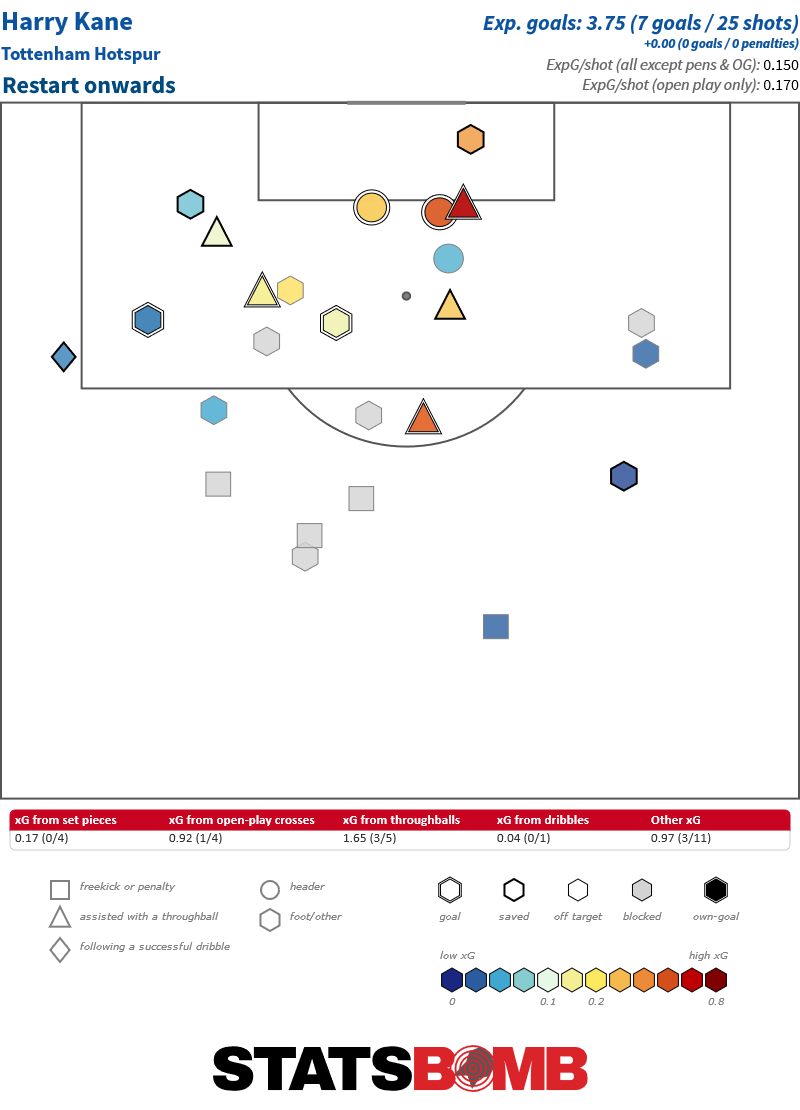 As important is the form of Son. A beacon of consistency in the aggregate throughout the good times, and not-so-good times, he has now registered four consecutive seasons oscillating close to a combined 0.7 per 90 for goals and assists, most usually ahead of expectation thanks to his versatile finishing. He can blow hot and cold at times from week to week, but when on-song, is as devastating an attacking midfielder as there is in the league:
As important is the form of Son. A beacon of consistency in the aggregate throughout the good times, and not-so-good times, he has now registered four consecutive seasons oscillating close to a combined 0.7 per 90 for goals and assists, most usually ahead of expectation thanks to his versatile finishing. He can blow hot and cold at times from week to week, but when on-song, is as devastating an attacking midfielder as there is in the league: 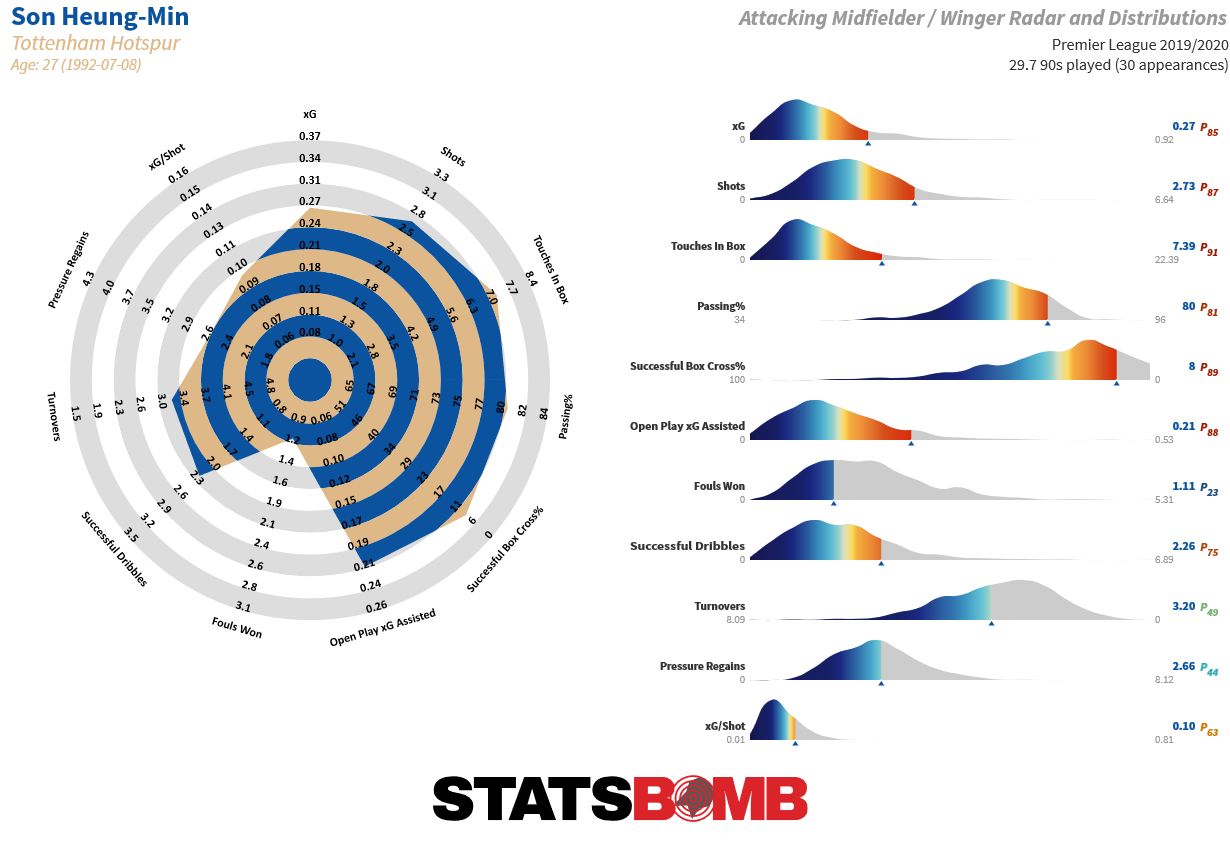 Projection Everything from a metric perspective at Tottenham has pointed downwards since the end of 2017-18, so the first thing to try and do is reverse that slide. Can Mourinho do that? His Zlatan-powered first Manchester United season was a legitimately dominant shooting team with a finishing problem, so there's a blueprint to get to a position of strength. The following season United finished second with 81 points despite less impressive metrics and season three is a well worn trail now. It's just about possible to give the benefit of the doubt and offer a pass for 2019-20 given weird circumstances and a mid-season appointment, but Tottenham will need to start well to keep any goodwill in the tank, and the Amazon documentary is dropping and building a whole new set of memes and storylines just as this season emerges. It's the Jose Mourinho Show again, and he needs to show he can still provide an above average return for his salary. Mourinho-era metrics don't yet offer solid encouragement, given how variable they have been. Teams with minus expected goal differences and minus shot counts simply don't earn high league positions in this league. The Sporting Index projection has Arsenal and Tottenham in the fifth and sixth slots, but no more than a result or two from below and significantly further away from Chelsea and Manchester United in the backend of the top four. Somewhere in the top four does represent the very best outcome, and a plan realised, but it is not the most likely outcome at all. However, if Tottenham can improve metrics and somehow stay in range of such an outcome deep into the season, all good, if not, then the Mourinho project may founder ahead of any expected three year timeline.
Projection Everything from a metric perspective at Tottenham has pointed downwards since the end of 2017-18, so the first thing to try and do is reverse that slide. Can Mourinho do that? His Zlatan-powered first Manchester United season was a legitimately dominant shooting team with a finishing problem, so there's a blueprint to get to a position of strength. The following season United finished second with 81 points despite less impressive metrics and season three is a well worn trail now. It's just about possible to give the benefit of the doubt and offer a pass for 2019-20 given weird circumstances and a mid-season appointment, but Tottenham will need to start well to keep any goodwill in the tank, and the Amazon documentary is dropping and building a whole new set of memes and storylines just as this season emerges. It's the Jose Mourinho Show again, and he needs to show he can still provide an above average return for his salary. Mourinho-era metrics don't yet offer solid encouragement, given how variable they have been. Teams with minus expected goal differences and minus shot counts simply don't earn high league positions in this league. The Sporting Index projection has Arsenal and Tottenham in the fifth and sixth slots, but no more than a result or two from below and significantly further away from Chelsea and Manchester United in the backend of the top four. Somewhere in the top four does represent the very best outcome, and a plan realised, but it is not the most likely outcome at all. However, if Tottenham can improve metrics and somehow stay in range of such an outcome deep into the season, all good, if not, then the Mourinho project may founder ahead of any expected three year timeline.
If you're a club, media or gambling entity and want to know more about what StatsBomb can do for you, please contact us at Sales@StatsBomb.com We also provide education in this area, so if this taste of football analytics sparked interest, check out our Introduction to Football Analytics course Follow us on twitter in English and Spanish and also on LinkedIn
